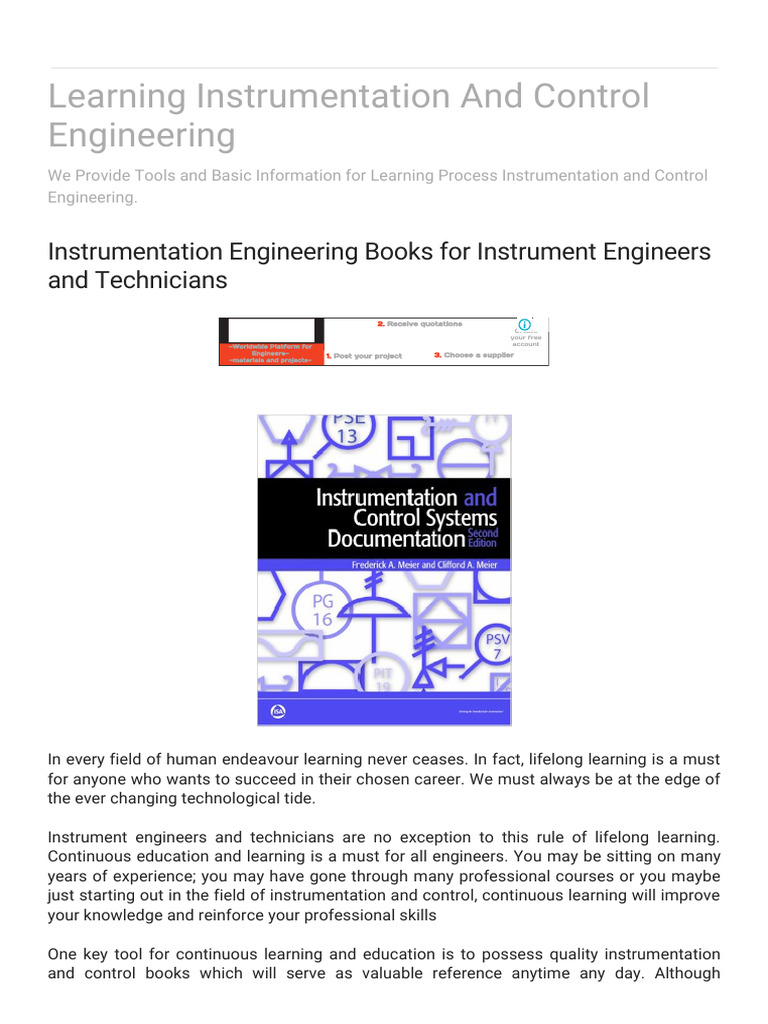Instrumentation engineering is an intricate field that amalgamates principles from electrical engineering, physics, and computer science to develop and maintain complex systems of measurement and control. As this discipline continues to advance, a plethora of texts emerge that seek to elucidate the arcane concepts and practices inherent in instrumentation engineering. Herein, we will traverse the landscape of significant texts that serve as both foundational resources and thought-provoking treatises, promising to invigorate the inquisitive mind and enhance professional acumen.
1. “Principles of Measurement and Instrumentation” by Alan S. Morris
This seminal work delineates the myriad methods of measurement and the core principles behind instrumentation practices. Morris employs a lucid yet comprehensive style, providing insights on sensor technology, data analysis, and error analysis. The text guides the reader through the intricate dance of theory and application, elucidating the ramifications of different measurement techniques and their suitability for various contexts. The systematic approach taken by the author allows practitioners to not only grasp fundamental concepts but also to cultivate a critical perspective on measurement uncertainties.
2. “Instrumentation and Control Systems” by William Bolton
Bolton’s book serves as an essential compendium, highlighting the convergence of control systems with instrumentation. Readers will find themselves immersed in topics ranging from basic signal processing to advanced control theories. The interlaced discussions of analog and digital systems expand the reader’s understanding of these technologies’ roles in modern instrumentation. This text challenges conventional thought, encouraging engineers to consider holistic perspectives on system design and implementation, fostering an understanding of the layered complexities present in industrial applications.
3. “Measurement Systems: Application and Design” by Ernest O. Doebelin
Doebelin’s treatise embodies a comprehensive exploration of the design requisites mandated by different measurement systems. With meticulous attention to detail, he scrutinizes the architectural decisions behind the instrumentation process, offering valuable insights into the interdependencies of sensors, transducers, and signal conditioning circuits. The book transcends mere theoretical analysis, offering practical design examples and case studies that engage the reader’s analytical faculties. This exploration ignites curiosity about the underlying mechanics driving measurement technologies and encourages progressive extrapolation into new territories of innovation.
4. “Fundamentals of Industrial Instrumentation and Process Control” by William Dunn
Dunn’s volume presents a panoramic view of industrial instrumentation, weaving together theory and practice. With chapters dedicated to process variables, the role of automation in instrumentation, and safety considerations, this work stands as a foundational resource for understanding modern industrial practices. The conversational yet authoritative tone invites readers to delve deeper into complex concepts, with well-crafted diagrams and examples that boost comprehension. Dunn’s insights into automation’s transformative potential within industrial settings provoke thought about future directions in instrumentation engineering.
5. “Control Systems Engineering” by Norman S. Nise
In this authoritative text, Nise provides an exhaustive overview of control theory, underscoring its relevance and application in instrumentation contexts. The textbook balances mathematical rigor with practical applications, serving both students and seasoned engineers. Compellingly structured, it enhances the reader’s ability to conceptualize control systems as dynamic entities that interact intricately with their environments. Nise’s focus on real-world applications instills a sense of applicability, compelling readers to engage with advanced topics such as stability analysis and controller design critically.
6. “Industrial Instrumentation: A Comprehensive Guide” by Jack G. W. Racz
This work delves into the paradigms governing industrial instrumentation systems. Racz’s comprehensive guide elucidates the integration of instrumentation within broader industrial processes, prompting engineers to think critically about value in operational efficiency. The text navigates through the intricacies of data acquisition, analysis, and real-time monitoring strategies, thereby delivering a multi-faceted perspective that encourages innovation. Racz invites readers to contemplate instrumentation not merely as tools, but as pivotal components driving organizational success.
7. “Process Control: Modeling, Design, and Simulation” by Dean C. Karnopp
Karnopp’s exploration into process control encompasses modeling techniques that are essential for an in-depth understanding of dynamic systems. The book bridges the gap between theoretical constructs and operational realities, equipping readers with skills requisite for designing and simulating real-world process control systems. The integration of simulation technologies into traditional instrumentation frameworks presents stimulating opportunities for engineers seeking to refine their approaches. This text is not just an academic resource; it is a portal to future methods of innovation within the field.
8. “Optical Fiber Sensors: Principles and Applications” by Chrisily V. V. Agrawal
This specialized text ventures into the avant-garde realm of optical fiber sensors, revealing their efficacy in a variety of instrumentation applications. Agrawal meticulously details the principles governing optical sensors, alongside their advantages in terms of durability and performance in challenging environments. With the inclusion of practical case studies, this work provokes a re-evaluation of conventional sensor methodologies, beckoning engineers to recognize the potential beyond traditional electronic instrumentation. Not only does it broaden the definition of instrumentation, but it also instigates a paradigm shift in the pursuit of robust and innovative sensing solutions.
In conclusion, the literature encapsulated within these strategic selections offers seasoned professionals and budding engineers alike profound insights into the multifaceted world of instrumentation engineering. The canon of knowledge conveyed through these texts cultivates a penchant for inquiry, inspiring readers to expand their horizons and embrace the complexities inherent in measurement and control systems. Each book stands as a beacon, illuminating not only the fundamentals of instrumentation but also the innovative landscapes that lie ahead. As the field evolves, so too will the literature, charting new territories in understanding and application that promise to challenge and enrich the engineering discipline.










